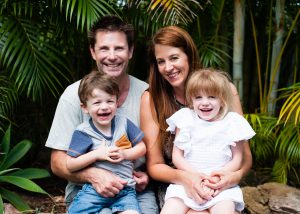Why Clinical Trials Matter to a Mum of Children with a Rare Disease
Today, May 20, is international clinical trials day – a time to celebrate all the stakeholders who oversee, fund, conduct, support and participate in clinical trials and create awareness about why clinical trials matter.

Photo by Ryan Clark – Clark Imagery (www.clarkimagery.com.au)
Just last week in Australia, there was a wonderful example of parents bringing hope to children with a rare disease through their advocacy for a clinical trial. The Donnell family have been instrumental through the Sanfilippo Children’s Foundation in attracting a company, Abeona Therapeutics, to run a gene therapy clinical trial in Australia. You may have seen Megan Donnell on the Sunrise program, and other places on the back of the trial receiving approval to proceed. There is no guarantee the trial will be suitable for Megan’s children, but that hasn’t stopped them doing all they can to bring the opportunity to the community in Australia. Inspired by her achievement, I reached out to Megan to learn a little more about her experience thoughts on clinical trials…
- So Megan, how and why did you first become to be aware of clinical trials? Did clinicians suggest them to you, or did you find out about them yourself?
I found out about them myself. At the time my children were diagnosed there was no clinical trial activity underway for their condition here in Australia. There was one trial a few years ago that our clinician spoke to us about. One of the larger rare disease pharmaceuticals was considering Australia as a site for one of their programs and we were contacted to see if we might be interested in our son participating (our daughter was not eligible as she was over the maximum age at the time). This trial did not go ahead due to low patient numbers here.
- In your experience, how well informed about clinical trials are the clinicians you’ve worked with? Did they welcome your questions about trials?
In my experience clinicians seem to be well informed about trials that are in progress and/or recruiting but less information is made easily available to them on those that might be coming through the pipeline or happening in other jurisdictions. It is impossible, particularly in the rare disease space, for a clinician to be across all information for all indications at any given time. I think that this is one area where patient groups like ours can play a role and help to disseminate this information.
- How did you go about encouraging a company to open a clinical trial in Australia?
Our organisation did provide initial seed funding to the biotech running the program and an Australian site was included in that agreement, however, this was not the only factor and as time has gone on I would say it became less important to them as they grew and brought in significant funding from other sources. More importantly, we were also able to demonstrate that there was significant support for this program both from the patient community and also clinically. We are very fortunate that the Primary Investigator for the Australian arm of the clinical trial at Adelaide Women’s and Children’s Hospital, Dr Nick Smith, has strong capability in this area having worked on similar trials overseas. I think this was a very important factor in encouraging the biotech to open a site here.
I think Australia is appealing as a potential site for clinical trials for US and UK companies to accelerate global trials with parallel sites as we are English-speaking (therefore don’t require protocols to be translated etc.) and have a well-regarded clinical capability and aligned regulatory framework.
- What have you found to be challenging, and what positive experiences have you had, in trying to get involved in clinical trials?
My involvement in the Gene Therapy clinical trial for Sanfilippo was really limited to funding of the biotech and introducing them to an Australian clinical team. Both of these things were done in my capacity as head of the Sanfilippo Children’s Foundation and beyond that I have had no involvement or influence. Limiting my involvement has been important as I wear 2 hats – one as head of the Foundation and the other as a mother of children who might potentially participate in this clinical trial – as such all parties have ensured from the outset that appropriate processes were in place to enable the trial to move forward without risk. At times this has been frustrating but of course I completely understand the necessity of it.
There have been so many positive experiences during this process. I am excited about the opportunity that a trial like this brings not only for the Sanfilippo community but for the path it might pave for similar trials for other conditions, particularly rare paediatric disorders. It is also great to see a trial in such a world-leading therapy here in Australia as often researchers are forced to move overseas to get involved in such projects.
- Knowing what you know now, what advice would you give to someone that found themselves or someone they care about with a new diagnosis? OR What is the one piece of advice you would give someone considering a clinical trial?
The first piece of advice I would give someone who found themselves or someone they care about with a new diagnosis is to get connected. Seek and engage anyone associated with the condition, whether they are in the next street or on the other side of the world – technology has made it easy to connect and share information. This includes families living with the condition, patient groups, researchers working in the field and industry (biotechs and pharma). These people will become a great support network and source of information and they will be the ones who know about what research, particularly that heading in to clinical trial, is happening around the world.
The second thing I would say is to have hope. I am not talking about false hope where miracles occur but never give up hope that you can provide a better life for your loved one than the one you were handed upon diagnosis. There is a lot that is happening in research and lots of opportunity for families to contribute to and influence that.
- Why do you think clinical trials matter? OR Why do you think people should think about investigating clinical trials as an option?
Clinical trials are obviously critical for the ongoing development of drugs and therapies that benefit the wider community and future generations. But for life-limiting conditions like Sanfilippo, clinical trials also represent a unique opportunity for patients to access emerging treatments that could be their only chance for intervention within their lifetime. When a condition is so aggressive and no approved treatments exist, access via a clinical trial is literally the only chance a patient might have.
The challenge of course is that this needs to be balanced with the primary purpose of a trial; that is to demonstrate safety and efficacy of a drug candidate, something that could be compromised if the focus is too heavily on access rather than eligibility. As drug development accelerates, particularly for severe genetic disorders, regulatory frameworks and clinical trial guidelines will need to carefully consider compassionate use and access policies to meet increasing demands.
I’d like to thank Megan for sharing her thoughts with us, and her tireless advocacy for her children, other children with Sanfilippo Syndrome, and clinical trials. I wish you, your husband and your gorgeous children a long and happy life together.
Happy International Clinical Trials Day.
– Janelle




Sorry, the comment form is closed at this time.